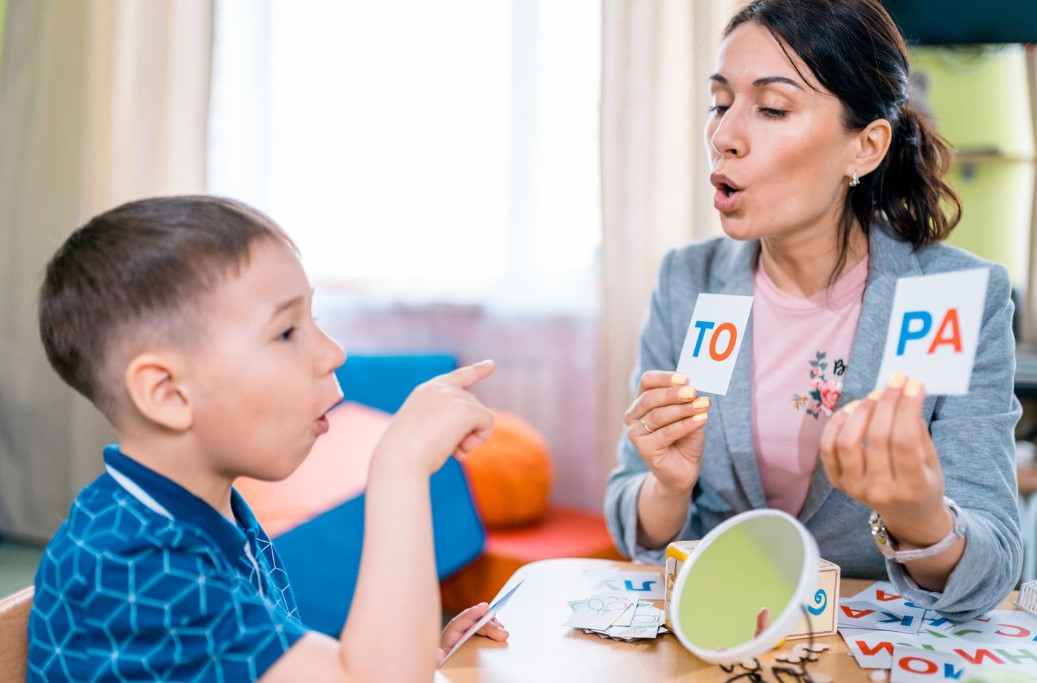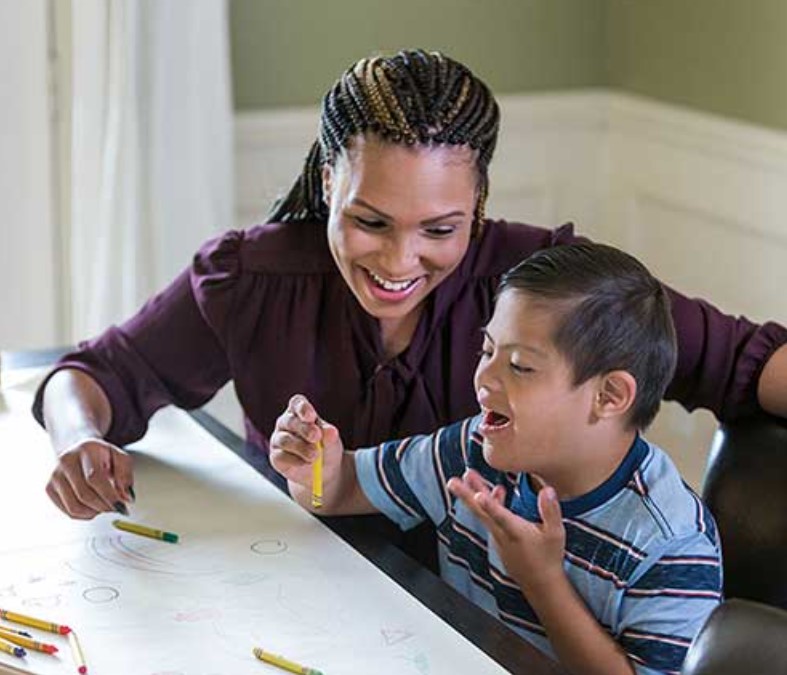Is your child experiencing difficulty speaking? Then, speech therapy might be the way to go. So, what is speech therapy? We’ve prepared a thorough guide on speech therapy for children for you.
With our guide, you can learn how speech therapy for kids works, what can be treated with it, and how to recognize if your child needs it. Moreover, you can learn about the success numbers of children’s speech therapy and how to practice it at home. With our guide, you’ll successfully learn everything you need to help your child through speech therapy.
In this article

This is a treatment for problems with speech and communication. It improves your child’s ability to speak and use language skills and can help them understand what others are saying. They will work with a speech-language pathologist or a speech therapist to achieve steady progress.
Speech therapy for children can include articulation practice, language intervention activities, or language comprehension. It can help your child with fluency, helping them become more comfortable and confident while speaking. Furthermore, speech therapy can assist your child in learning how to express what they want clearly.

First, speech therapy starts with a speech therapist’s assessment of your child’s communication disorder and finding the best way to fix it. Speech therapy can be done one-on-one or in a small group. Based on your child’s problem and age, your speech therapist will find the most suitable speech therapy exercises.
The main goal of this approach is to improve pronunciation, learn how to speak correctly, and strengthen the muscles used in speech. Thus, a speech therapist finds methods that work best for your child and their speech impediments. Speech therapy for children usually involves word board games, play, and sequencing activities.
For example, your child’s speech therapy might include reading out loud. This helps your child strengthen the link between their mouth and their brain. Speech therapy could include tongue and mouth exercises or facial movements. Playing language-based games is the most successful way to keep the child interested in speech therapy.

Speech therapy is a complex treatment for numerous problems connected to speech and communication. Your child’s healthcare provider may even suggest speech therapy if they have difficulty hearing or swallowing. Overall, speech therapy has a broad use and can help with numerous problems, including the following:
- Speaking
- Listening Social skills
- Understanding language Reading
- Using voice, etc.
Therefore, speech therapy can help with numerous conditions your child might have. These conditions can include stuttering, cluttering, sigmatism, etc. Speech therapy can help with more severe disorders like cerebral palsy, intellectual disability, brain injury, or developmental delays.
Furthermore, speech therapy can be a good solution for children with receptive disorders. Children with receptive disorders have difficulty understanding and processing what other people say, which is why you can use speech therapy as a treatment for children with autism or hearing loss to help them understand and use speech more fluently.

You’re probably wondering if speech therapy works. The answer is yes. Speech therapy has already helped millions improve their speech and communication skills. However, there’s not one universal solution for all children. Your speech therapist will help you set realistic goals for your child based on their needs and condition.
Your child’s speech therapy success depends on the severity of their disorder, age, and willingness to get help. The age of your child is crucial to the success of speech therapy. The younger your child is, the better the results of speech therapy., and your involvement in your child’s treatment is crucial too.

All children develop differently. Parents sometimes have a hard time accepting that their kids might have some problems. However, you need to pay attention to your kids and the way they speak.
If they have difficulty pronouncing words, stutter, or clutter words, it might be time to consult a speech therapist. Stuttering can happen suddenly, usually when your child is two or three. They might need speech therapy if they only say a small number of words. That doesn’t necessarily mean that there is a speech impediment, but it shouldn’t be ignored.
Next, if your child has difficulty articulating certain sounds, they might have a speech impairment. Articulation is crucial to your child’s development and growth. However, if your child omits some vowels and consonants or doesn’t produce clear sounds, you should consult a speech therapist.
On a different note, if your child shows difficulty comprehending words and simple statements and doesn’t understand clear orders or questions, you can seek the help of a speech-language pathologist.
You might also notice your child being quiet at social gatherings and can’t express themselves. Consult a speech therapist if you see anything abnormal about your child’s speech and communication.

First, you need to understand that speech therapy is a process, it takes time and effort, and you won’t see immediate results. You must be patient and persistent to help your child overcome speech difficulties. Each child is unique.
Some children improve their speech in a shorter time – some may require years of therapy to see improvement. If a health condition causes a speech disorder, it might improve as your child recovers from it. You just need to be consistent and persistent.
The length of the speech therapy depends on several factors, such as age, type of speech disorder, severity, health problems, and frequency of therapy. A speech disorder developed in childhood can improve as kids age, or it could continue into adulthood. The latter will require long-term therapy and consistency.
If your child has suffered a brain injury or has developmental delays, speech therapy will be a long process, and improvement will take much more time. The more they attend speech therapy, the faster the progress will be noticed.

Learning to speak is a skill, and every skill needs practice. Speech therapy is crucial for your child’s speech improvement, but you can’t rely only on that. You must regularly practice together at home to ensure your child improves their speaking and communication skills.
Your involvement as a parent is essential for successful speech therapy. Especially with younger children, parents play a crucial role in speech therapy and speech improvement. Children love spending time with their parents, so we’ve prepared a few tips on how you can help your child overcome their speech impediment.
It can be easy to tend to your child’s needs whenever they point at something, but it’s highly discouraged. You’re not helping your child in the long run by anticipating their needs. If your child knows you’ll jump to give them whatever they want just by pointing at stuff or crying, they won’t see the need to use words.
Encourage them to use words and ask for what they need. If your child points at bread, refrain from immediately handing it to them. Instead, ask them what they want. Encourage them to use complete sentences when they ask for stuff and praise them when they do. Try implementing this as much as possible at home to get your child used to speaking.
If your child struggles to build vocabulary and doesn’t use words to answer questions, maybe you can try giving them options. Instead of asking open questions, give them a controlled-environment question. Your child will find it much easier to answer a question with choices than to think of a correct answer themselves.
For example, don’t ask your child what they want to drink. They’ll probably find it hard to answer. Instead, ask them if they would like tea or milk with dinner. When your child hears the options, they already have the answer given – they just need to pick one.
Try to adopt this method in every aspect of your child’s life. Eventually, your child will be confident to make decisions and answer openly.
Nowadays, children love spending time on their mobile devices. There are numerous speech therapy apps available online. Consult your speech therapist on which apps best suit your child’s needs. These apps will help your child practice speech in a fun and easy way, monitor their progress, and enjoy the apps and games with your child.
However, you must be careful of your child spending too much time on their mobile phone. You can install a parental control app on their phone – we suggest installing Wondershare FamiSafe.
This excellent parental control app helps you control your child’s screen time and monitor their app and Internet use. With Wondershare FamiSafe, you can also monitor their progress on their speech control apps.

Reading a book to your child can be a fun bonding time for you two. If you don’t want speech therapy at home to seem like an exercise, reading to your child is the perfect solution. However, make sure you don’t just read your child bedtime stories. Instead, make reading to your child interactive.
For example, stop after a few paragraphs and ask your child questions about what you read, like “What color was the house?” or “Where did they go?” After you’re done with a story, ask your child what part was their favorite. Additionally, you can encourage your child’s imagination and ask them to create their ending or answer “what if?” questions.
If your child has trouble following directions and comprehending speech, take it slow. Remember to give them easy instructions with two steps. For example, avoid telling your child to bring you a ball. Instead, tell them, “Go to your room and get me the blue ball.”
This dissects the instruction and makes it easier for your child to understand. Remember to be patient, as this may take time.
On the other hand, encourage them to give you directions. For instance, if they ask you to bring them their shoes, ask where you can find them. Then, patiently wait for your child’s directions. Allowing them to give you directions helps your child practice their speech and logical thinking, and they’ll practice articulation and boost self-confidence.
If you notice your child has difficulty pronouncing words and forming sentences, you should take your child to a speech therapist. Speech therapy is determined based on your child’s unique needs and conditions, so treatment and speech exercises will vary from child to child.
As a parent, you need to be as persistent as possible to ensure your child shows progress. The length of speech therapy depends on age, frequency of sessions, type of speech disorder, etc. However, your involvement in your child’s therapy and practicing at home with them daily is crucial to improving your their speaking and communication skills.
